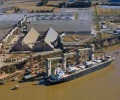

Argentina will sub-contract the dredging of the Parana River, the country’s key grains export superhighway, for one year while the government prepares a longer-term concession, according to a decree issued on Thursday.
The National Ports Administration has been given authority over the next 12 months to subcontract management of the waterway, while the Transportation Ministry evaluates bids from dredging companies for the long-term concession to follow.
“The Ports Administration will enter into the necessary contracts to guarantee navigability,” the decree said.
Under the upcoming year it will be the state, rather than the dredging company, that charges tolls to cargo ships using the waterway. Until now the dredging company has charged the fee.
The decree said there will be a “possible revision of rates and/or tolls, taking into consideration the opinions of users.”
But private sector leaders say they are against the state increasing its role in the country’s main logistics system.
“It would be a big mistake for the state to directly manage the dredging of the river. It does not have the economic or technical resources to do that,” said Gustavo Idigoras, head of the CIARA-CEC chamber of grains processing and export companies.
The Parana has been managed for the last 25 years by Belgian dredger Jan de Nul, which has continued managing the river under a 90-day contract it was awarded in April. The company is expected to bid for the concessions.
Argentina is the world’s No. 3 corn exporter and top supplier of soymeal livestock feed, used to fatten hogs and poultry from Europe to Southeast Asia. About 80% of the country’s grains exports flow down the Parana from the Pampas farm belt to the shipping lanes of the Atlantic.
Navigability of the Parana is the key to Argentina’s ability to transport grains, the main source of export dollars needed to replenish central bank reserves strained by a long economic recession exacerbated by the coronavirus pandemic.
The Parana River has made Argentina one of the world’s most efficient food exporters. Cargo ships loaded directly at Rosario avoid using inefficient barges and trucking that bog down shipping in Brazil and the United States.
The river at Rosario is dredged to about 34 feet deep, and industry leaders want the next long-term contract to provide for a deeper and wider shipping channel.
Source: Reuters (Reporting by Maximilian Heath, writing by Hugh Bronstein; Editing by David Gregorio)